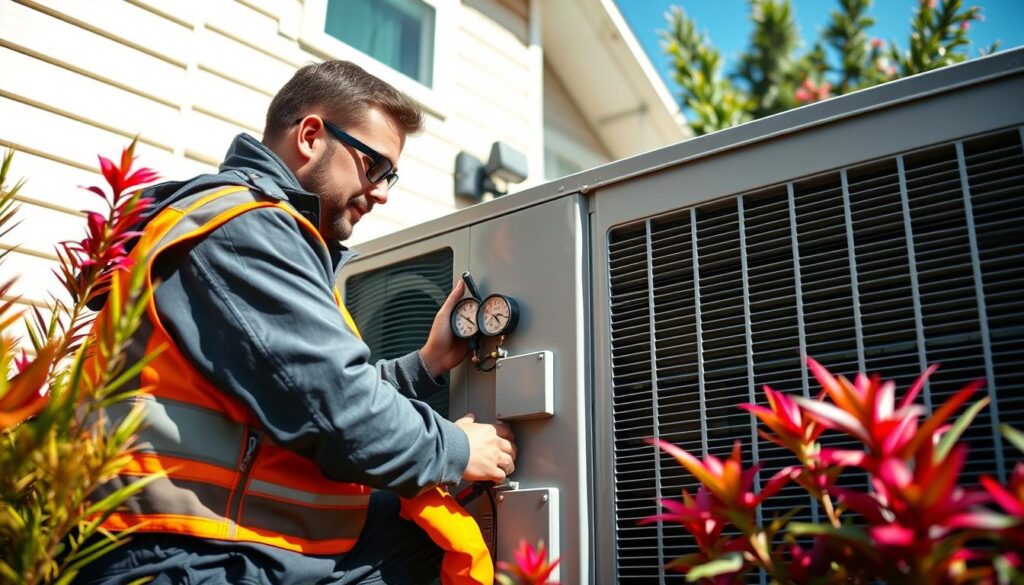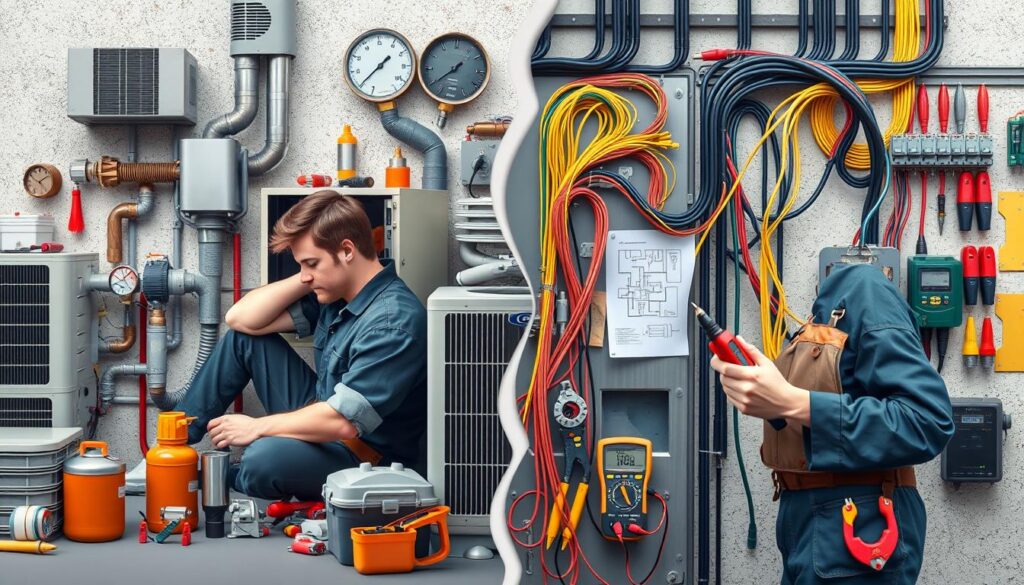Affiliate Disclosure
HVAC Guide Guys is a participant in the Amazon Services LLC Associates Program, an affiliate advertising program designed to provide a means for sites to earn advertising fees by advertising and linking to Amazon.
Can HVAC Techs Become Electricians? Are you an HVAC technician thinking about switching to electrician work? The skilled trades offer great opportunities, good pay, and a chance to help build important infrastructure. But can HVAC techs really become electricians? This guide will look at the good and bad sides of making this career change. It will help you decide if this move is right for you.

Key Takeaways
- Understand the fundamental differences and similarities between HVAC and electrical work.
- Explore the educational requirements and licensing guidelines for electricians.
- Assess your transferable skills and experience to determine if the transition is feasible.
- Discover training pathways and certification requirements to become a licensed electrician.
- Analyze the job market and growth potential for HVAC technicians-turned-electricians.
Table of Contents
Understanding the Career Transition from HVAC to Electrical Work
Switching from HVAC to electrical work can lead to new career paths and better pay. Yet, it comes with its own set of hurdles. Those looking to make this change must face more training and get the right licenses to work legally.
Benefits of Making the Switch
One big plus of switching to electrical work is the chance to earn more. Electricians typically make about $5,000 more each year than HVAC techs. Both fields are also seeing more job openings, with growth expected to keep going through 2022.
Common Challenges in Transition
One big challenge is the physical demands of electrical work. Many say it’s tougher, especially for those in their 30s or 40s. HVAC techs also worry about the risks of falls, shocks, and cuts that come with electrical jobs.
Required Skills Assessment
- Both HVAC and electrical work need a good grasp of theory, troubleshooting, and controls.
- In some states, HVAC techs might need a “type S” electrical license for certain tasks.
- Electricians might need to focus on areas like controls building, which requires extra training and certification.
It’s key to check your current skills and what you need to learn when moving from HVAC to electrical work. This ensures a smooth transition into your new field.
“HVAC technicians and electricians earn similar compensation, but the average annual salary for electricians is about $5,000 higher than that of HVAC techs.”
| Skill | HVAC Technician | Electrician |
|---|---|---|
| Troubleshooting | ✓ | ✓ |
| Controls Understanding | ✓ | ✓ |
| Refrigerant Handling | ✓ | – |
| Specialized Electrical License | ✓ (in some states) | ✓ |
Explore Our HVAC Shop
Looking for top-rated HVAC tools, parts, and accessories? Visit our shop and find the perfect solution for your needs.
Visit the ShopThe Fundamental Differences Between HVAC and Electrical Work
HVAC technicians and electricians both need technical skills. But, their main jobs are different. HVAC workers handle heating, ventilation, air conditioning, and refrigeration systems. Electricians work on electrical wiring, circuit breakers, and lighting in homes, businesses, and factories.
HVAC jobs often mean working with heavy, greasy tools in tight spots like attics. Electricians face a variety of tasks, from fixing industrial electrical systems to simple home repairs. Both jobs need strong technical skills, safety awareness, and problem-solving abilities.
| HVAC Technicians | Electricians |
|---|---|
|
|
Both HVAC and electrical work need a lot of technical training and experience. But, the jobs and work places are quite different. Knowing these differences is key for those thinking of switching from HVAC to electrical work.
Educational Requirements and Licensing for Electricians
To become an electrician, you can choose from trade school or an apprenticeship. Both paths take about 4-5 years. Trade schools teach electrical theory, safety, and the National Electrical Code. Apprenticeships mix on-the-job training with classroom learning.
Trade School Programs
Many electricians start with trade school. It gives a strong base in electrical knowledge. For instance, the New England Institute of Technology offers an associate degree in electrical technology. The Community College of Rhode Island has a four-year apprenticeship for licensed journeyman electricians.
Apprenticeship Requirements
- Apprenticeships last 2 to 5 years and include 700 to 900 hours of classroom time.
- Apprentices work under experienced electricians. They learn tasks like installing fire alarms and troubleshooting electrical issues.
- You can find apprenticeships on local job boards, the U.S. Department of Labor, and through organizations like the National Electrical Contractors’ Association.
State-Specific Licensing Guidelines
Licensing for electricians varies by state. It usually involves passing an exam and showing work experience. For example:
- In Alabama, you need 8,000 hours of experience. You can swap one year of education for 1,000 hours.
- In Alaska, you must have 8,000 hours of work experience. At least 6,000 hours must be in commercial or industrial settings.
- In Arizona, you need four years of experience for all electrical classifications. You must also be licensed for solar work separately.
It’s important to check your state’s licensing rules to make sure you qualify.
Explore Our HVAC Shop
Looking for top-rated HVAC tools, parts, and accessories? Visit our shop and find the perfect solution for your needs.
Visit the ShopCan HVAC Techs Become Electricians? Transferable Skills and Experience
If you’re an HVAC technician thinking about becoming an electrician, you might be surprised. You already have many useful skills. HVAC work teaches you about solving technical problems, understanding building systems, and following safety rules. These skills are also important in electrical work.
Both HVAC and electrical jobs need strong customer service skills. You also need to be good at reading technical blueprints. Your knowledge of control systems and energy efficiency can help you in electrical work. Plus, you might have helped electricians with tasks like installing electrical parts and wiring.
Many HVAC training programs teach electrical safety and practices. This means you can work safely with high voltages. This knowledge in electrical theory and wiring is a big plus for becoming an electrician.
“The Refrigeration School’s programs include electrical courses that cover safety standards and wiring techniques, giving HVAC students a strong grasp of electrical concepts.”
With your transferable skills, technical knowledge, and experience in safety protocols and customer service, you’re well-prepared. You can make a successful switch from HVAC to electrical work.

Training Pathways and Certification Requirements
Switching from an HVAC tech to an electrician needs specific certifications and more training. The key credential is the Journeyman Electrician license. This license takes 2-4 years, with both technical classes and apprenticeship work.
Required Certifications
To get a Journeyman Electrician license, HVAC techs need these certifications:
- EPA 608 Certification: This is needed for HVAC techs before they can work in the electrical field.
- EPA 608 Universal Certification: This covers all refrigerant types, giving a full understanding of refrigerant management.
- Journeyman Electrician License: This state-issued license requires a formal apprenticeship and a licensing exam.
Timeline for Transition
The time it takes for an HVAC tech to become an electrician varies. It usually takes 2-4 years. This includes:
- Getting the EPA 608 and EPA 608 Universal Certifications (6 months to 1 year)
- Finishing a Journeyman Electrician apprenticeship program (2-4 years)
- Passing the Journeyman Electrician licensing exam
Cost Considerations
The cost for an HVAC tech to become an electrician is significant. It depends on the training program and location. Costs include:
| Training Program | Estimated Cost | Duration |
|---|---|---|
| HVAC Training at Penn Co Tech | $20,000+ | 6 months to 2 years |
| HVAC Training at Orleans Tech | $11,500 (all-inclusive) | 24 weeks |
| EPA 608 Certification Exam | $80 | N/A |
| Journeyman Electrician Apprenticeship | Varies (includes hourly wage) | 4-6 years |
Some employers offer on-the-job training or financial help for this career change. It’s worth looking into these options.
Explore Our HVAC Shop
Looking for top-rated HVAC tools, parts, and accessories? Visit our shop and find the perfect solution for your needs.
Visit the ShopJob Market Analysis and Career Opportunities
The job outlook for electricians is very promising. The U.S. Bureau of Labor Statistics (BLS) says there will be a 6% growth in employment from 2022 to 2032. This is faster than the average for all jobs, showing a strong need for skilled electricians in many fields.
California, Texas, New York, Florida, and Ohio are the top states for electrician jobs. The need for energy-efficient systems and smart home tech is growing. This creates new chances for electricians with these skills.
HVAC technicians also have a bright future, with a 6% growth in employment expected. There will be about 37,700 job openings each year. HVAC technicians are key in installing and keeping HVAC systems running in homes and businesses.
Investments in infrastructure and clean energy, like the Infrastructure Investment and Jobs Act, boost the demand for skilled workers. Many in the current workforce are nearing retirement. This means lots of career chances for those wanting to become electricians or HVAC technicians.
| Occupation | Projected Employment Growth (2022-2032) | Projected Job Openings (Annual Average) | Median Annual Wage (2024) |
|---|---|---|---|
| Electricians | 6% | 73,500 | $64,398 |
| HVAC Technicians | 6% | 37,700 | $57,424 |
| Welders, Cutters, Solderers, and Brazers | N/A | 42,000 | N/A |
The electrician job market is very appealing, especially for HVAC technicians looking for new career growth and industry demand opportunities.
Salary Comparison and Growth Potential
Thinking about switching from HVAC technician to electrician? It’s key to know the salary differences and future earnings. Electricians usually make more than HVAC technicians. In 2023, electricians earned a median of $60,040, while HVAC techs made $57,300.
Entry-Level vs. Experienced Pay Rates
New electricians start at about $38,470 a year. The top 10% can earn up to $104,180. HVAC techs, on the other hand, start at $37,270 and top out at $84,250.
Regional Salary Variations
| Location | Electrician Salary | HVAC Technician Salary | Plumber Salary |
|---|---|---|---|
| California | $75,870 | $61,670 | $72,000 |
| Illinois | $83,140 | $57,460 | $86,200 |
| Hawaii | $79,290 | $69,100 | $72,830 |
| Puerto Rico | $29,810 | $26,260 | $23,680 |
| Washington | $79,050 | $62,310 | $79,390 |
Long-term Financial Prospects
Electricians are expected to see a 11% job growth from 2023 to 2033. This is quicker than most jobs. With higher pay, especially for those with experience, electricians look to have good long-term financial prospects.
Explore Our HVAC Shop
Looking for top-rated HVAC tools, parts, and accessories? Visit our shop and find the perfect solution for your needs.
Visit the ShopTips for a Successful Career Transition
Switching from HVAC to electrician can be thrilling and fulfilling. But, it needs careful planning and prep. Here are some key tips for a smooth career change:
- Research the Electrical Field Thoroughly: Learn about the latest trends, rules, and tech in the electrical field. This will help you understand what being an electrician entails.
- Network with Experienced Electricians: Talk to professionals in the electrical field. Ask for their advice and learn from their experiences. Networking can open new doors and give you valuable insights.
- Gain Hands-on Experience: Look for internships, part-time jobs, or apprenticeships in the electrical field. This hands-on experience will help you build skills and show your commitment to employers.
- Invest in Continuing Education: Keep up with new electrical codes, tech, and best practices. Take extra training, get certifications, or go back to school to boost your knowledge and job prospects.
- Develop Strong Communication and Business Acumen: Good communication and business skills are key for electricians. Work on these through workshops, courses, or coaching to improve your career.
By following these tips, you can make a successful switch from HVAC to electrician. This will set you up for long-term success and growth.
| Career Opportunity | Average Salary |
|---|---|
| Energy Auditor | $54,050 per year |
| Building Automation Specialist | $66,000 per year |
| Technical Sales Representative | $70,000 per year |
| Facilities Manager | $80,850 per year |
| HVAC Instructor | $55,000 per year |
| Mechatronics Technician | $61,000 per year |
| Automation Technician | $63,000 per year |
A successful career change needs dedication, persistence, and a willingness to learn. Use these tips and your existing skills to start a rewarding career as an electrician.

Conclusion
Switching from an HVAC technician to an electrician can be very rewarding. It offers new challenges and chances in the skilled trades. You’ll need more training and a license, but it can lead to a fulfilling job with good pay and prospects.
Before making the switch, HVAC technicians should think about their skills, interests, and career goals. Knowing how to work with electrical parts, following safety rules, and keeping up with new tech are key. These skills help in making a smooth transition to electrical work.
With their HVAC experience and the right training, technicians can find many jobs in the electrical field. They can work on homes, businesses, or in industrial settings. Staying updated with new skills and knowledge helps them grow and succeed in their new career.

